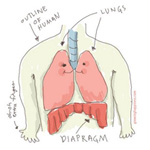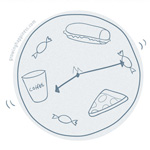Reboiling Points
Boiling Water Multiple Times Not As Harmful to Health As Thought
There was an elderly tea lady (let’s call her Mrs D) at the place I used to work. She wasn’t a tea lady in the traditional sense who’d wheel her trolley of goodies at teatime — she prepared refreshments for our weekly meetings — but she loved observing me while I brew a cuppa in the office pantry, which made me slightly nervous at times.
I was about to make myself a cup of instant coffee one day when I found the electric kettle filled with enough water to make a warm cup of coffee. Because of the ridiculous subarctic temperature of the office, I preferred my coffee tongue-scalding hot so I did what I thought was the obvious thing to do — I turned the kettle back on.
 Already anxious by her mere presence, I was startled silly when Mrs D boomed, “What on earth are you doing?! Why are you boiling the water again? You’re not supposed to do that!”
Already anxious by her mere presence, I was startled silly when Mrs D boomed, “What on earth are you doing?! Why are you boiling the water again? You’re not supposed to do that!”
I told her about my coffee temperature preference but she continued disapprovingly, “but you’re not supposed to reheat water that’s already been boiled!!!” When I tried asking her the reason why she kept saying that I wasn’t supposed to. I asked another colleague who happened to be there and she said the same thing, “you’re not supposed to boil water multiple times because it’s not good for you!!!”
Outnumbered with no desire to argue, I left the scene with a less-than-hot cup of coffee.
Being the naturally curious person that I am, I decided to ask the rest of my colleagues about this. The consensus was nearly unanimous(a few had never heard of it) — you shouldn’t boil water more than once — the reasons were similar – reboiled water is not good. Why exactly? They didn’t have an answer.
I wasn’t convinced and brushed it all aside as old wives’ tales. However, despite my numerous make-coffee-while-no-one-is-around attempts later, I kept forgetting to research the reasons and origins for this theory.
![]()
5 years later
I was at a coffee house while waiting for my camera to be serviced the other day when out of boredom, I decided to read all their coffee and tea leaflets. There was a section devoted to the importance of using fresh water for brewing coffee and tea. I didn’t think much about it until much later when I was making meyself a cup of coffee at home.
Remembering the Water Mystery from half a decade ago, I consulted my friend Google: Reboiled water causes cancer? – not true unless your water is already toxic to begin with. Reboiling causes water to harden? – not true either. Then I found this:
10 Tips for A Better Cup of Tea
The more oxygen that is dissolved in water, the better it tastes. So, to make sure you use water with the maximum amount of oxygen, don’t re-boil any leftover water in your kettle. Water that is boiled too much becomes poorly aerated because oxygen atoms escape in the form of steam. By always filling your kettle up afresh, you are ensured fully aerated and tasty water.”
Ten Tips for a Betta Cuppa-Fresh Water, Best water MSN Encarta
Mystery solved.
Edit: Thanks to the comment by Mihai, I suddenly remembered learning about water aeration in school. Here’s a bit more on that:
“Aerated water is, correctly speaking, distilled water to which purified air is added to improve its flavor. Wikipedia”
Related Posts:

Mags | Woo-Woo Wisdom at 2:26 am on June 12, 2008
Christopher Waldrop at 8:20 am on June 12, 2008
I love the idea of a leisurely afternoon tea but at the moment I don't even have enough time for to properly enjoy my short coffee breaks!
Ginger M at 11:31 am on June 12, 2008
Anya at 1:23 am on June 13, 2008
Colin at 8:45 am on August 31, 2008
Wicus Lab at 1:40 am on September 10, 2008
bhuvaneswari at 4:29 am on November 18, 2008
Mihai at 6:01 am on January 8, 2009
Shang at 6:42 am on February 19, 2009
hweegan at 8:44 pm on March 24, 2009
Siew at 2:53 am on April 3, 2009
Stan at 8:41 am on July 12, 2009
Edwin at 8:00 pm on December 3, 2009
Stan at 9:35 pm on February 8, 2010
Twitter; Twettle « Mike Street Media – Freelance Website Designer at 7:56 am on April 22, 2010
mike at 9:46 am on June 23, 2010
Mr. tea at 5:23 pm on September 9, 2010
B.f.B at 7:04 am on December 21, 2010
Theewater: vaker koken? at 8:01 am on February 22, 2011
J at 5:44 pm on May 25, 2011
El Gato at 12:01 am on December 13, 2011
Conor Graham at 6:01 pm on March 20, 2012
Better Oxygen = Better Taste = Better For You | | OxygenSuperCharger.com BlogOxygenSuperCharger.com Blog at 8:02 am on April 23, 2012
Stuart at 10:44 pm on August 31, 2012









Christopher Waldrop at 10:36 am on June 11, 2008